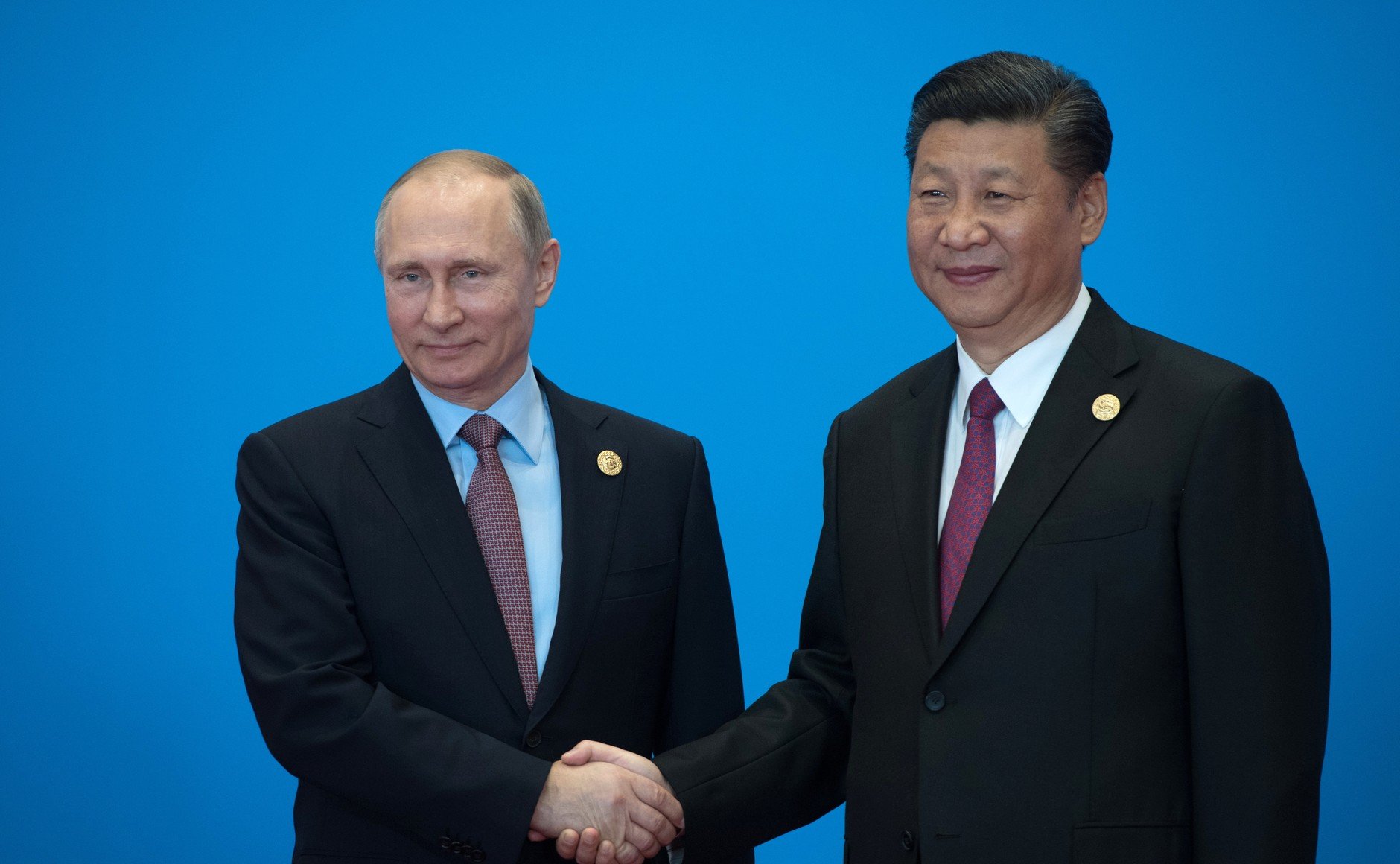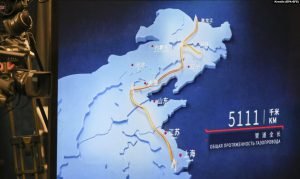China, Russia Deepen Their Ties Amid Pandemic, Conflicts With The West

President of Russia Vladimir Putin with President of China Xi Jinping before a roundtable meeting of leaders during the Belt and Road international forum. Photo by the Russian Presidential Press and Information Office.
This article was originally published Sept. 1, 2020, on Radio Free Europe/Radio Liberty.
By Reid Standish
Russia has begun work on one of the world’s largest polymer plants, an $11 billion project that has its sights set on the Chinese market as economic ties between Beijing and Moscow grow.
With ground being broken on August 18, the massive project will make plastic components and will further boost trade between China and Russia in the latest display of expanding bilateral relations, as the two countries forge an economic and political partnership after decades of rivalry.
The project — located in Amur, near the Chinese border in Russia’s Far East — is being developed by Russia’s Sibur Holding petrochemical company along with China’s giant Sinopec Group, which will hold a 40 percent stake in the initiative. It is scheduled to begin production in 2024.
The plant, which is one of the largest investment projects in Russia, is part of a growing trend of new initiatives between Beijing and Moscow that has seen ties deepen and evolve amid the twin pressure of the coronavirus pandemic and the escalating economic and political conflict between the United States and China.
From big gas projects in Russia’s Arctic to growing partnerships in high tech and working together to reduce their dependence on the U.S. dollar, Beijing and Moscow are finding more opportunities for cooperation.
In December, Russia began sending natural gas to China through the 2,900-kilometer Power Of Siberia pipeline and President Vladimir Putin announced plans in March to start working on a second pipeline, Power Of Siberia 2.
And while China-Russia trade fell in the first five months of the year due to the global economic slowdown, bilateral trade soared in 2019 to a record of more than $110 billion. The two countries have also announced new scientific cooperation geared toward testing vaccines for COVID-19.
“On nearly every front, Russia and China have been coming closer,” Artyom Lukin, a scholar of China-Russia relations at the Far Eastern Federal University in Vladivostok, told RFE/RL. “We are seeing the long-term trend of China’s rising economic importance for Russia.”
Building Ties
But while the pandemic has made China an even more vital economic lifetime and market for Russia, Moscow has become a more needed partner for Beijing as it collides with U.S. President Donald Trump’s administration over a wide range of issues: from a trade war to problems involving Hong Kong and rights in the South China Sea.
This new dynamic offers a turnaround of the forces that drove Beijing and Moscow together following the Kremlin’s annexation of Crimea in 2014, where Russia was placed in the crosshairs of Western sanctions.
During that period, it was Russia that leaned on a sometimes reluctant China to deepen relations to escape U.S. pressure.
Now — as their ties have extended into areas such as military, technology, and finance — those roles are shifting.
“Before Trump, China was cautious to embrace Moscow geopolitically to the fullest extent, but Beijing has determined that U.S. pressure won’t let up, so they have no choice but to move closer to Russia,” said Lukin. “Today, it is China, not Russia, that is more interested in forming this quasi-alliance.”
Russia-China collaboration took off in 2014 after the forcible annexation of Crimea and the ensuing war in eastern Ukraine and has since grown into a variety of domains. One such area of late has been efforts to limit reliance on the U.S. dollar, a process called de-dollarization.

The U.S. dollar holds a powerful place in the global financial system as the world’s reserve currency and de-dollarization has become a priority for both China and Russia to protect their bottom line and push back against American dominance. Replacing the dollar in trade settlements became a necessity to circumvent U.S. sanctions against Russia and efforts have gained speed following Washington’s imposition of tariffs on Chinese goods.
Experts have long warned about efforts to limit the dollar’s privileged role in the world, and though such attempts have not had much success, Beijing and Moscow have made some progress recently.
New data from the Bank of Russia shows that in the first quarter of 2020, the dollar’s share of trade between Russia and China fell below 50 percent for the first time on record, a notable change given that the dollar comprised more than 90 percent of trade in 2014. While the dollar still accounts for 46 percent of the deals between them, the euro has risen and become the currency of choice and, to a lesser extent, the ruble and renminbi, China’s currency.
“This has been going on for several years and is by no means limited to just Russia and China,” Zhang Xin, an associate professor at the Center for Russian Studies at Shanghai’s East China Normal University, told RFE/RL. “But it shows how since 2014 both countries are coming together through common external pressure, from the [United States] in particular.”
Navigating A New Reality
The pandemic and falling oil prices have hurt Russia’s pockets, leaving it more reliant on China economically.
In the energy sphere, Russia has displaced Saudi Arabia as China’s biggest oil supplier and Gazprom — Russia’s massive gas company — plans to more than triple gas deliveries to China through its new pipelines, amounting to nearly half of current Chinese demand. Russia is also looking to capitalize off of the U.S.- China trade war by increasing its exports of food and minerals at the expense of the United States and other Western nations.
Russia’s political appeal has grown as Beijing finds itself facing new global pressure: Its signature foreign policy project, the Belt and Road Initiative, has suffered setbacks due to concerns in host countries over mounting debts; the pandemic that first appeared in the central Chinese city of Wuhan has hurt Beijing’s credibility; and Western nations have begun to push back against Chinese tech and political policies.
In the face of this pressure, China has moved to hold Russia up as a steadfast partner.
During China’s annual legislative meeting in May, Foreign Minister Wang Yi hailed Russia, saying that it supported Beijing and that both countries would stand “shoulder to shoulder” against U.S. efforts to hold Beijing responsible for the pandemic’s consequences.
“The model of cooperation has changed this year,” Aleksei Maslov, director of the Institute of Far Eastern Studies at the Russian Academy of Sciences, told RFE/RL. “China feels that its position in the world is not as stable as before. This has led to them changing their mind towards Russia and becoming more cooperative.”
An Uncertain Future
But the growing ties between China and Russia also mask tensions under the surface.
While Moscow is keen to benefit from the financial opportunities opened up in China, it is also wary about becoming too dependent on China, both economically and politically.
“I don’t think you can call this an alliance,” said Maslov. “Right now, Russian and Chinese interests coincide, but there are lots of areas that could create problems and spoil cooperation.”
Projects like the polymer plant in Amur are being heralded by both sides, but past initiatives, such as a water-bottling plant on Lake Baikal and logging projects in the Siberian forests, have faced protests in Russia.
The initial stages of the pandemic were also a source of friction, with Russia shutting down its nearly 4,200-kilometer border with China and Moscow Mayor Sergei Sobyanin enacting a series of controversial policies targeting the Chinese community, leading to a rare rebuke from the Chinese Embassy in Moscow, which complained directly to the Kremlin.
Similarly, Valery Mitko, a 78-year-old retired scientist, was detained in June on charges of passing Russian submarine-detection technology secrets to China. Mitko denies the charges, but the case highlights the suspicions that still characterize the two countries’ relations.
“The trust in the top leadership — between Putin and [Chinese President Xi Jinping] — is very solid, but when you work your way down, you can see the problems,” said Zhang.
“Overall, things have become more pragmatic and realistic. Neither side expects unconditional support from the other on every issue,” he concluded.
Copyright (c)2020 RFE/RL, Inc. Reprinted with the permission of Radio Free Europe/Radio Liberty, 1201 Connecticut Ave NW, Ste 400, Washington DC 20036.

RFE/RL's mission is to promote democratic values by providing accurate, uncensored news and open debate in countries where a free press is threatened and disinformation is pervasive. RFE/RL reports the facts, undaunted by pressure.
RFE/RL is registered with the IRS as a private, nonprofit Sec. 501(c)3 corporation, and is funded by a grant from the U.S. Congress through the United States Agency for Global Media (USAGM) as a private grantee. All major policy determinations governing RFE/RL operations are made by RFE/RL's Board of Directors. RFE/RL's editorial independence is protected by U.S. law.
BRCC and Bad Moon Print Press team up for an exclusive, limited-edition T-shirt design!
BRCC partners with Team Room Design for an exclusive T-shirt release!
Thirty Seconds Out has partnered with BRCC for an exclusive shirt design invoking the God of Winter.
Lucas O'Hara of Grizzly Forge has teamed up with BRCC for a badass, exclusive Shirt Club T-shirt design featuring his most popular knife and tiomahawk.
Coffee or Die sits down with one of the graphic designers behind Black Rifle Coffee's signature look and vibe.
Biden will award the Medal of Honor to a Vietnam War Army helicopter pilot who risked his life to save a reconnaissance team from almost certain death.
Ever wonder how much Jack Mandaville would f*ck sh*t up if he went back in time? The American Revolution didn't even see him coming.
A nearly 200-year-old West Point time capsule that at first appeared to yield little more than dust contains hidden treasure, the US Military Academy said.












